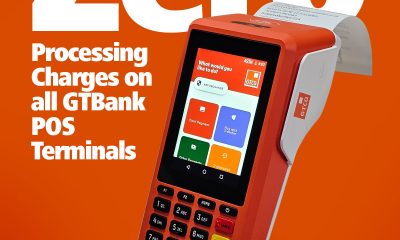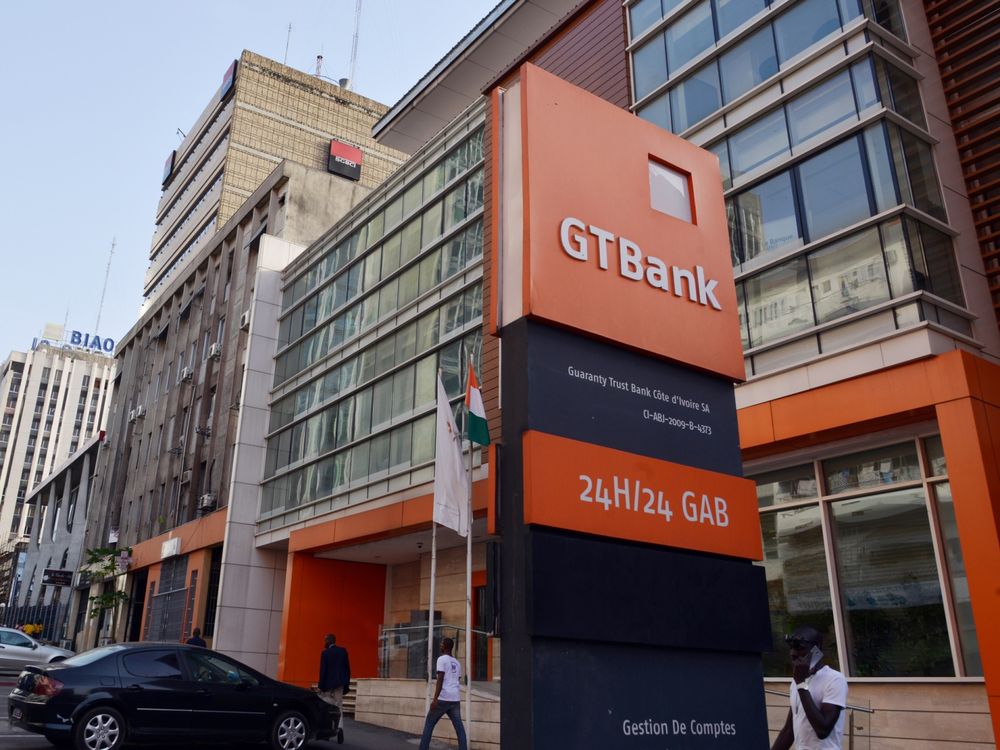Banking
GTBank Drives Mobile Banking With *737* Code

By Dipo Olowookere
There have been many testimonies from holders of accounts in Guaranty Trust Bank Plc (GTBank) that the *737* mobile banking code has taken financial transactions to another level.
The initiative by GTBank has been applauded by many because they say it has exceeded customers’ expectation.
The *737* is a mobile channel, which enables the bank’s customers to conveniently perform third party transfers to both GTBank and other bank account holders in Nigeria via mobile phones.
This is done by dialling the right code with details of the amount and account number of the beneficiary, writes
Mobile payment is where the world is heading. Financial institutions with foresight on the future are redefining their commitment to electronic payment, churning out products and services to serve customers better.
GTBank, it is the right way to serve the customers better. The lender unveiled the Bank *737* platform to help deepen its mobile banking, to strengthen its leadership potentials in the mobile banking space.
Also for GTBank, Bank *737* is just a creativity that emerged out of the box. It is an expression of outstanding intuition, which only very few brilliant innovators can attempt. It is also one of the benefits of the cash-less banking, which was one of the biggest news that hit the sector in January 2012.
The objective, the Central Bank of Nigeria (CBN) said, was to change the cash-driven economy and reduce the rising cost of banking operations. The policy is also designed to promote financial intermediation, financial inclusion, minimise revenue leakages, eliminate robbery and encourage e-payment.
The coming of cashless financial system has indeed, given great opportunities to institutions that possess the innovative instincts to break the bricks. Ordinarily, one would not imagine that financial transactions could be done without one inching close to any banking hall.
GTBank’s Group Managing Director/CEO, Mr Segun Agbaje, has consistently told the bank’s customers that Bank *737* is an innovation whose time has come. He was not joking when he told his customers that people might not have any need to go into the banking halls for anything, anymore because they can stay in the comfort of their homes and carry out banking transactions.
To the bank chief, when the electricity challenges are finally settled, more would come in the way of innovation and that is the time a full classification of the efficiency of the core financial institutions would be known.
The current bubble that greeted the fortunes of the bank could not be unrelated to the level of innovation that has trailed the bank’s creativity over the years, like ‘licensing’ a new bank, which runs on phones.
That was why Mr Agbaje could stand up anywhere and tell a motley crowd of GTBank stakeholders that their bank would make a whopping N125 billion profit after tax, some N30 billion higher than its current record, in its 2016 financial activities without fuss.
The bank, which prides itself as not really affected by the backlash of the Treasury Single Account policy (TSA), is greatly optimistic that it has not been a public sector bank and would continue to innovate to find a flourishing middle ground for its more than seven million customers in the country.
He described the 2015 financial year as really a very bad year, “a very difficult year, Credit Rediscount Rate(CRR) went up to 34 per cent, Commission on Turnover (COT) was totally down and forex got so bad. “We are creating a bank where you do not come into the bank to do anything. We are leveraging technology to take people out of the banking hall.
“You are going to do most of your banking activities today without coming to the banking hall. We cannot achieve inclusive banking by building more branches, but by providing more enabling platforms to get people do more, and that is where banking is going,” Mr Agbaje said.
While pouring encomium on his staff, the CEO explained that his bank is not excited about any form of merger and acquisition as his bank has planned to grow organically.
He saw a lot that could be done to attain the desired height even as he would want the bank to do any good business that could add good value to the economy.
He also saw agriculture as a sector that needed a lot of push, but was quick to indicate that agriculture loan books did not grow fast even as the medieval industry remained key to the growth of the economy. There is no doubt that Mr Agbaje is an apostle of gradual and careful growth.
With his bank’s current financial report, Mr Agbaje looks good to keep the best result among all the banks for the 2015 year, considering the fact that banks whose business prospects look as good as that of GTBank may have reported far less performance for the period. This explains the progressive plan of the bank to remain on top as the most profitable bank within the period in review.
With a gross income rolling over N300 billion, there are clear indications that the careful spending pattern the bank has adopted will further offer it some more profit advantage. This may even grow in double digits as its new IT platform will usher a new cost-cutting mechanism, as less emphasis on new branches can really add up as new gains.
Mr Agbaje feels that the internet and telephone banking platforms are becoming very successful. A good size of the youth, according to him, is in it and they are enjoying the blitz.
Banking
Public Offer: Sterling Holdco Allots 13.812 billion Shares to 18,276 Shareholders

By Aduragbemi Omiyale
Sterling Financial Holdings Company Plc has allotted shares from its public offer of 2025 to investors with valid applications.
The allotment follows the earlier receipt of final approval from the Central Bank of Nigeria (CBN) and the recent clearance by the Securities and Exchange Commission (SEC).
In September 2025, the financial institution offered for sale about 12,581,000,000 ordinary shares of 50 kobo each at N7.00 per share in public offer.
However, the exercise received wide participation from the investing public, with the company getting 18,280 applications for 16,839,524,401 ordinary shares valued at approximately N117.88 billion.
Following a thorough verification process, valid applications were received from 18,276 shareholders for a total of 13,812,239,000 ordinary shares, representing a subscription level of 109.79 per cent and reflecting sustained confidence in Sterling Holdco’s strategic direction, governance, and long-term growth prospects.
The firm approached the capital market for additional funds for the recapitalisation of its two flagship subsidiaries, Sterling Bank and The Alternative Bank.
The capital injection will support the commencement of full operations and contribute to the group’s revenue diversification objectives.
In line with the guidelines set out in the offer prospectus, Sterling Holdco confirmed that all valid applications will be allotted in full. Every investor who complied with the terms of the offer will receive all the shares for which they applied.
A very small number of applications were not processed or were partially rejected due to non-compliance with the offer terms, including duplicate payments and failure to meet the minimum subscription requirement of 1,000 units or its multiples, as stipulated in the offer documents.
The group ensures a seamless post-offer process, with refunds for excess or rejected applications, along with applicable interest, to be remitted via Real Time Gross Settlement or NIBSS Electronic Funds Transfer directly to the bank accounts detailed in the application forms.
Simultaneously, the electronic allotment of shares has be credited to successful shareholders’ accounts with the Central Securities Clearing System (CSCS) on February 17, and for applicants who do not currently have CSCS accounts, their allotted shares will be temporarily held in a registrar-managed pool account pending the submission of their completed account opening documentation to Pace Registrars Limited, after which the shares will be transferred to their personal CSCS accounts.
Banking
CBN Governor Seeks Coordinated Digital Payment Reforms

By Modupe Gbadeyanka
To drive inclusive growth, strengthen financial stability, and deepen global financial integration across developing economies, there must be coordinated reforms in digital cross-border payments.
This was the submission of the Governor of the Central Bank of Nigeria (CBN), Mr Olayemi Cardoso, at the G‑24 Technical Group Meetings in Abuja on Thursday, February 19, 2026.
According to him, high remittance costs, settlement delays, fragmented systems, and heavy compliance burdens still limit the participation of households and Micro, Small and Medium Enterprises (MSMEs) in global trade.
The central banker emphasised that efficient payment systems are essential for economic inclusion, highlighting that global remittance corridors still incur average costs above 6 per cent, with settlement delays of several days, excluding millions from modern economic activity.
Mr Cardoso cautioned that while digital payments present significant opportunities, they also carry risks such as currency substitution, weakened monetary transmission, increased FX volatility, capital-flow pressures, and regulatory fragmentation.
The G-24 TGM 2026, themed Mobilising finance for sustainable, inclusive, and job-rich transformation, convened global financial stakeholders to advance the modernisation of finance in support of emerging and developing economies.
The CBN chief reaffirmed Nigeria’s commitment to working with G-24 members, the IMF, the World Bank Group, and other partners to build a more inclusive, resilient, and development-oriented global financial architecture.
“We have strengthened our AML/CFT frameworks in line with FATF guidelines, requiring strict dual-screening of cross-border transactions to mitigate risks.
“To deepen regional integration, the CBN introduced simplified KYC/AML requirements for low-value cross-border transactions to encourage broader participation in PAPSS, easing processes for Nigerian SMEs and enabling faster intra-African trade payments.
“We have also embraced fintech innovation through our Regulatory Sandbox, allowing payment-focused fintechs to test secure, instant cross-border solutions under close CBN supervision,” he disclosed.

Banking
Unity Bank, Providus Bank Merger Awaits Final Court Approval

By Modupe Gbadeyanka
The merger and business combination between Unity Bank Plc and Providus Bank Limited remains firmly on course, a statement from one of the parties disclosed.
According to Unity Bank, there is no iota of truth in reports in certain sections of the media suggesting that the merger process had stalled, as the transaction remains firmly on track.
It was disclosed that the necessary regulatory steps have been completed, but only a few other steps to finalise the transaction, especially the final court sanction.
There had been speculations that both lenders may not meet the new minimum capital requirement of the Central Bank of Nigeria (CBN) before the March 31, 2026, deadline.
However, it was noted that the combined capital base of Unity Bank and Providus Bank exceeds N200 billion, which is the minimum requirement to retain a national banking licence under the CBN’s recapitalisation framework.
When completed, the Unity-Providus merger is expected to deliver a stronger, more competitive, and customer-centric financial institution — one with the scale, innovation, and reach to redefine the retail and SME banking landscape in Nigeria.
“The merger with Providus Bank significantly enhances our capital base, operational capacity, and strategic positioning.
“We are confident that the combined institution will be better equipped to support economic growth and deliver innovative financial solutions across Nigeria,” the chief executive of Unity Bank, Mr Ebenezer Kolawole, stated.
Recall that a few months ago, shareholders authorised the merger between the two entities at Court-Ordered Meetings. They also adopted the scheme of merger at their respective Extraordinary General Meetings (EGMs) in September 2025,
The central bank also backed the merger, with a pivotal financial accommodation to support the transaction. The merger also received a further boost with a “no objection” nod from the Securities and Exchange Commission (SEC).
The regulatory approvals form part of broader efforts to strengthen the resilience of Nigeria’s banking system, reinforce capital adequacy across the sector, and mitigate potential systemic risks.
The development positions the combined entity among the 21 banks that have satisfied the apex bank’s new capital threshold for national banking operations.
-

 Feature/OPED6 years ago
Feature/OPED6 years agoDavos was Different this year
-
Travel/Tourism10 years ago
Lagos Seals Western Lodge Hotel In Ikorodu
-

 Showbiz3 years ago
Showbiz3 years agoEstranged Lover Releases Videos of Empress Njamah Bathing
-

 Banking8 years ago
Banking8 years agoSort Codes of GTBank Branches in Nigeria
-

 Economy3 years ago
Economy3 years agoSubsidy Removal: CNG at N130 Per Litre Cheaper Than Petrol—IPMAN
-

 Banking3 years ago
Banking3 years agoSort Codes of UBA Branches in Nigeria
-

 Banking3 years ago
Banking3 years agoFirst Bank Announces Planned Downtime
-

 Sports3 years ago
Sports3 years agoHighest Paid Nigerian Footballer – How Much Do Nigerian Footballers Earn




















